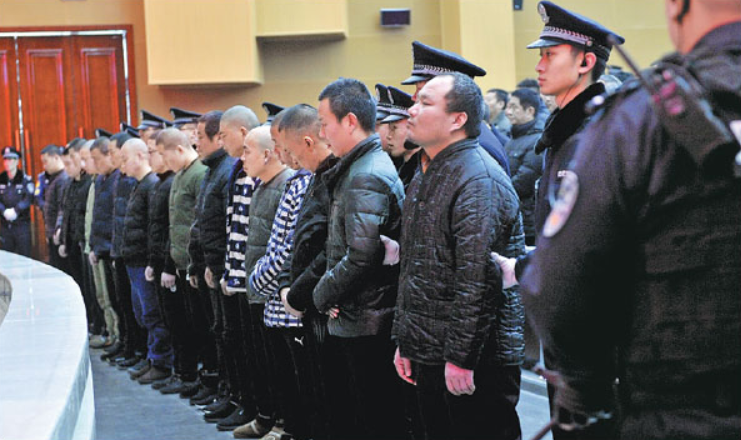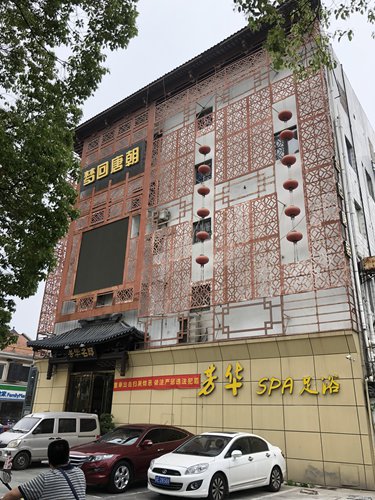
From the People's Daily app.
And this is Story in the Story.
An unprecedented crackdown has been carried out in China against entertainment venues providing illegal services in conjunction with the country's three-year national campaign against gang crimes, which entered a key phase in 2019.
Since China launched its three-year national campaign against gang crimes in January 2018, 1,082 mafia-style gangs had been dismantled and 1,620 guns seized by December 2018.
The campaign, which aims to "pull out the roots" of organized crimes and their "protective umbrellas", is reported to be mainly targeted at illegal services, unqualified fire protection equipment and nuisance problems.
Insiders estimated that about 21,000 nightclubs and bars across the country have been shut down during the campaign, affecting 3 million employees.
Today’s Story in the Story looks at China’s fight against “soft violence,” an emerged type of offenses along with the anti-crime campaign of China.

A mafia-style crime gang is sentenced at Lintong District People's Court in Xi'an, Shaanxi province, in January. (Photo: China Daily)
Years before, the use of the word "fighting" related to targeting actual crimes, but now, Chinese government is tackling the source of the problem and strengthen comprehensive social governance to “sweep away” illegal behaviors.
Ran Saiguang, a professor of law at the National Police University for Criminal Justice in Baoding, Hebei province, said the change of name signals the campaign's higher aspirations.
After several similar campaigns in recent decades, gangsters have become more cunning and have set up companies or associations to conceal the true nature of their activities, Ran said.
Violence remains a strong feature of organized crime, but new types of offenses have emerged, such as "soft violence" by which gangs threaten people without resorting to physical beatings, which makes it harder to conduct investigations, he added.
Stalking, throwing feces on others or restricting the personal freedom of others have been categorized as "soft violence," according to an announcement from China's law enforcement authorities.
"Soft violence" has long troubled law enforcement personnel at the basic level as no regulation clarifies what this behavior is or tells them how to deal with it.
Du Hangwei, vice minister of the MPS, noting that "public security bureaus should implement the new regulations carefully."
Wen Liehong, who arranged for clients to participate in gambling sessions and loaned them money at usurious rates, was convicted of fraud, bribery and perjury, accumulated huge wealth after setting up casinos in Changsha's major hotels in 2002.
From 2005 to 2009, he hired a number of people to collect debts, and in 2010, he set up a pawnshop that loaned money at high rates of interest. The following year, he boosted the number of gang members by recruiting unemployed locals.

A closed nightclub on Huaihai Road of Suzhou, East China's Jiangsu Province, has an anti-crime banner hung on its wall. (Photo: Global Times)
The outfit had a strict structure and clear hierarchy: in addition to Wen, there were three key members, five active participants and 16 other members. When police cracked the organization, they seized cash and property valued at $178 million, according to the court.
In 2016, the head of a bank committed suicide after approving a large loan to a property developer who defaulted after losing the money at one of Wen's casinos.
Though Wen and his criminal gang were sentenced to life imprisonment and punished, the existence of “protective umbrella” gave the police officer a hard time to investigate.
In December 2014, when Changsha police started investigating Wen, he sought help from Zhou, a former director of the Hunan Office for Comprehensive Management of Social Security. The two became friends, and Zhou ordered Changsha police to suspend the investigation and disclosed Wen’s activities.
However, Ran, the professor, said that having been the victims of criminal gangs, members of the public are now beneficiaries of the campaign.
As such, they will become more active in the crackdown and provide police with more tips and clues.
“The latest phase of the crackdown has achieved satisfactory results and led to a hardening of public opinion against criminal organizations and corrupt officials,” he added.
“This year, the campaign will go deeper, aiming to solve more complicated cases and uncover more corrupt officials,” he said.
(Produced by Nancy Yan Xu, Brian Lowe, Lance Crayon, Paris Yelu Xu, and Chelle Wenqian Zeng. Music by: bensound.com. Text from Global Times and China Daily)


